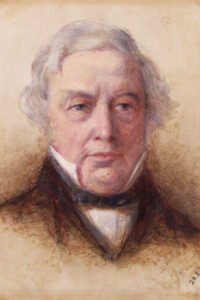
Nightmare Abbey
Nightmare Abbey, a venerable family mansion, in a highly picturesque state of semi-dilapidation, pleasantly situated on a strip of dry land between the sea and the fens, at the verge of the county of Lincoln, had the honor to be the seat of Christopher Glowry, Esquire. This gentleman was naturally of an atrabilarious temperament, and much troubled with those phantoms of indigestion which are commonly called blue devils. He had been deceived in an early friendship: he had been crossed in love; and had offered his hand, from pique, to a lady, who accepted it from interest, and who, in so doing, violently tore asunder the bonds of a tried and youthful attachment. Her vanity was gratified by being the mistress of a very extensive, if not very lively, establishment; but all the springs of her sympathies were frozen. Riches she possessed, but that which enriches them, the participation of affection, was wanting. All that they could purchase for her became indifferent to her, because that which they could not purchase, and which was more valuable than themselves, she had, for their sake, thrown away. She discovered, when it was too late, that she had mistaken the means for the end—that riches, rightly used, are instruments of happiness, but are not in themselves happiness. In this wilful blight of her affections, she found them valueless as means: they had been the end to which she had immolated all her affections and were now the only end that remained to her. She did not confess this to herself as a principle of action, but it operated through the medium of unconscious self-deception and terminated in inveterate avarice. She laid on external things the blame of her mind’s internal disorder and thus became by degrees an accomplished scold. She often went her daily rounds through a series of deserted apartments, every creature in the house vanishing at the creak of her shoe, much more at the sound of her voice, to which the nature of things affords no simile; for, as far as the voice of woman, when attuned by gentleness and love, transcends all other sounds in harmony, so far does it surpass all others in discord, when stretched into unnatural shrillness by anger and impatience.
Mr Glowry used to say that his house was no better than a spacious kennel, for everyone in it led the life of a dog. Disappointed both in love and in friendship, and looking upon human learning as vanity, he had come to a conclusion that there was but one good thing in the world, videlicet, a good dinner; and this his parsimonious lady seldom suffered him to enjoy: but, one morning, like Sir Leoline in Christabel, ‘he woke and found his lady dead,’ and remained a very consolidate widower, with one small child.
Read or download Book
Thomas Love Peacock
Thomas Love Peacock (18 October 1785 – 23 January 1866) was an English novelist, poet, and official of the East India Company. He was a close friend of Percy Bysshe Shelley and they influenced each other’s work. Peacock wrote satirical novels, each with the same basic setting: characters at a table discussing and criticizing the philosophical opinions of the day.
Biography.
In February 1800, Peacock became a clerk with Ludlow Fraser Company, who were merchants in the City of London. He lived with his mother on the firm’s premises at 4 Angel Court Throgmorton Street. He won the eleventh prize from the Monthly Preceptor for a verse answer to the question “Is History or Biography the More Improving Study?”. He also contributed to “The Juvenile Library”, a magazine for youth whose competitions excited the emulation of several other boys including Leigh Hunt, de Quincey, and W. J. Fox. He began visiting the Reading Room of the British Museum and continued doing so for many years, diligently studying the best literature in Greek, Latin, French, and Italian. In 1804 and 1806 he published two volumes of poetry, The Monks of St. Mark and Palmyra. Some of Peacock’s juvenile compositions were privately printed by Sir Henry Cole.
In around 1806 Peacock left his job in the city and during the year made a solitary walking tour of Scotland. The annuity left by his father expired in October 1806. In 1807 he returned to live at his mother’s house at Chertsey. He was briefly engaged to Fanny Faulkner, but it was broken off through the interference of her relations. His friends, as he hints, thought it wrong that so clever a man should be earning so little money. In the autumn of 1808, he became private secretary to Sir Home Popham, commanding the fleet before Flushing. By the end of the year, he was serving Captain Andrew King aboard HMS Venerable in the Downs. His preconceived affection for the sea did not reconcile him to nautical realities. “Writing poetry,” he says, “or doing anything else that is rational, in this floating inferno, is next to a moral impossibility. I would give the world to be at home and devote the winter to the composition of a comedy.” He did write prologues and addresses for dramatic performances on board HMS Venerable. His dramatic taste then and for the next nine years resulted in attempts at comedies and lighter pieces, all of which lacked ease of dialogue and suffered from over-elaborated incidents and humor. He left HMS Venerable in March 1809 at Deal and walked around Ramsgate in Kent before returning home to Chertsey. He had sent his publisher Edward Hookham a little poem of the River Thames which he expanded during the year into “The Genius of the Thames”. On 29 May he set out on a two-week expedition to trace the course of the Thames from its source to Chertsey and spent two or three days staying in Oxford.
Peacock travelled to North Wales in January 1810 where he visited Tremadog and settled at Maentwrog in Merionethshire. At Maentwrog he was attracted to the parson’s daughter Jane Gryffydh, whom he referred to as the “Caernavonshire nymph”. Early in June 1810, the Genius of the Thames was published by Thomas and Edward Hookham. Early in 1811, he left Maentwrog to walk home via South Wales. He climbed Cadair Idris and visited Edward Scott at Bodtalog near Tywyn. He also visited William Madocks at Dolmelynllyn. His journey included Aberystwyth and Devil’s Bridge, Ceredigion. Later in 1811, his mother’s annuity expired and she had to leave Chertsey and move to Morven Cottage Wraysbury near Staines with the help of some friends. In 1812 they had to leave Morven Cottage over problems paying tradesmen’s bills.






